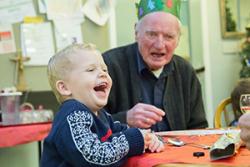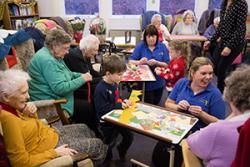Combining daycare for children and elders benefits all generations
![]() This article by Catrin Hedd Jones, Lecturer in Dementia Studies, School of Healthcare Sciences was originally published on The Conversation. Read the original article.
This article by Catrin Hedd Jones, Lecturer in Dementia Studies, School of Healthcare Sciences was originally published on The Conversation. Read the original article.
We live in a society where care of young and old is increasingly segregated, with very limited opportunity for the two age groups to interact. If we just thought a little more socially, however, these “book end generations” could become great resources for each other – all we need to do is put them in the same place.
 Hen Blant Bach broadcast recently on S4CI recently took part in a S4C documentary, which introduced six nursery children to an adult day care facility. The older and younger generations spent three days together, taking part in a series of activities devised by a team of psychologists including myself here at Bangor University.
Hen Blant Bach broadcast recently on S4CI recently took part in a S4C documentary, which introduced six nursery children to an adult day care facility. The older and younger generations spent three days together, taking part in a series of activities devised by a team of psychologists including myself here at Bangor University.
What we found was that just a few days in each others’ company resulted in some life affirming interactions, with both care staff and service users commenting on how beneficial the intergenerational project had been. But this was not just about helping elders: the children enjoyed the increased attention too, and had more opportunities to develop their social and emotional skills.
Admittedly, this is just one three-day example. But there is plenty of research confirming that bringing generations together can and should be the way forward for care systems.
Shared care internationally
The concept of “non-familial intergenerational interactions” is centred around the seemingly simple idea that old and young can bring new energy, knowledge and enthusiasm to each others’ lives. In the last 20 years or so this concept has been increasingly picked up – particularly in the US, where more and more shared care facilities are being opened.
Interaction between the generations is not as simple as putting a baby and toddlers’ day care centre in a nursing home, however. It involves planned interactions between elders and college students, schoolchildren, or youngsters of other ages in a variety of settings.
What the groups do when they meet can be as relaxed as playing a game or reading a book together. But the activities they take part in are truly unlimited: in New Jersey an intergenerational orchestra brings together musicians aged between six and 90-years-old, for example. While in the Massachusetts town of Belmont, young and old work together on local environmental projects.
 It may not seem like a lot in the grand scheme of things, but research has proven that these interactions can have fantastic benefits for each generation. In Australia and the UK studies have shown that activities that include children and older adults in a day care facility can increase self-esteem and promote friendships. In Japan, shared play activities have been found to result in greater smiles and more conversation for elders.
It may not seem like a lot in the grand scheme of things, but research has proven that these interactions can have fantastic benefits for each generation. In Australia and the UK studies have shown that activities that include children and older adults in a day care facility can increase self-esteem and promote friendships. In Japan, shared play activities have been found to result in greater smiles and more conversation for elders.
There are other wider societal benefits of putting the two types of day care together too. Rent and staff costs can take up as much as 95% of expenditure at care facilities, but both are reduced when shared care is adopted. Savings like this could have huge benefits in countries like the UK where health care relies on public money.
Sadly, without someone in place to keep an intergenerational project moving forward, many end after two years. Investing in staff time, and ensuring the time young and old spend together is planned and appropriate for all ages is key to the care practice working. The two groups cannot just be left in a room together, the idea here is to build relationships, and help each person benefit from the enthusiasm, knowledge and attitudes of each other.
Valuing older people
In the 1950s, it was theorised that adults have a need to contribute to the next generation, and that doing so can give older people feelings of accomplishment or success, rather than stagnation, as they age. Intergenerational activities show elders that they are valued as individuals that still possess lifelong skills, rather than just being passive recipients of care.
After we filmed our documentary, one lady who attended the care facility told me that you don’t think about your age when you are in the company of young children. The little ones brought a new sense of vibrancy and fun to the centre, and the focus was no longer on watching time pass but on living in the moment.
Elders have the time, and skills that are often underutilised, for this kind of care to work, so putting a shared care plan in place makes sense. But more research, funding, and government support is needed for these intergenerational schemes to become the world’s default for care.
These days traditional families are separated by distance, time and lack of understanding between generations, but programmes that bring children and older adults together could change the whole of society’s outlook. Children are the worlds’ future but that doesn’t mean we should consign older generations to the past.
![]()
Publication date: 4 January 2017
